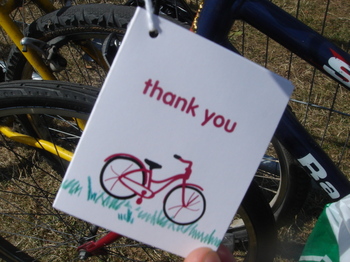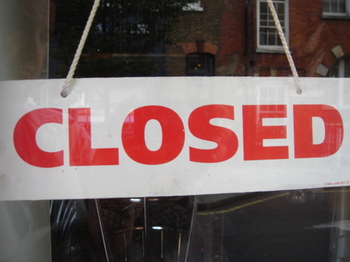I'm working on a presentation for someone right now, I'm going to share some first thoughts with them tomorrow, on the general theme of 'interesting things that are going on'. They're a fascinating company with some great brands, which do some really smart things - but they seem to want to know more about what's going on 'out there'. What 2.0y things should they be thinking about?
Isn't this always the case? - it's the interesting companies that want to know more. The dull ones are just happy to stick with what's worked so far.
Anyway. The plan tomorrow is to share a list of the kind of things that might be interesting to talk about and make sure I'm heading in the right direction and I couldn't think of a better way of putting that together than just sticking it here. Links from PowerPoint is still kind of clunky. So here it is. I'm also trying to lump things into useful conceptual chunks, just so the whole things a bit more comprehensible.
The Challenge Of Openness
There's a whole interesting saga in the Coke/Mentos story. I think I should talk about that. Starting here. And contrasting this reaction and this.
Which then leads into talking about the goodness and badness of The Coke Show. Which of course I can't link to, which is part of the badness.
I guess the big point to this section is the general demand out there for openness. And the way that brands can use that well or can find themselves caught completely off-guard. I guess the more practical point is that something unexpectedly good or bad can happen overnight, and you need to create an organisation and some communication habits which can cope with and ideally exploit the unexpected. Because the idea of a secret brand organisation, lurking in the background, which no-one thinks about, has well and truly gone.
Then I thought I'd talk about some of the good and open things that people have done - splendid wholesome things like peas, smoothies and mothers. (via Chroma).
I was also wondering about touching on the way openness is going to impact the way marketing people do their jobs - not just the relationships they build between brands and consumers. This is a great example. As is, I guess, the fact that I'm writing this.
Does that make sense so far?
Community, Collaboration and Co-Creation
(God, I wish there were better words than 'community' 'collaboration' and 'co-creation').
I found a fantastic thing to talk about yesterday (via Beyond Madison Avenue and DailyFix). The Fiskateers. A community and blog project created for Fiskars by Brains On Fire. (Though maybe created is the wrong word, it seems artificial then, and the joy of this thing is it's not artificial.)
And actually I think community is a strong, often overlooked point about Run London. The best campaigns were the second one (I'll do it if you do it) and probably this year's. Both of them are about running as a communal activity. It would also make sense to talk about joga at this point. And The Chain. The interesting thing about them, to me, is the delicate balance you have to strike between giving people a framework to play in and not interfering with their play.
Mind you, I was also thinking about creating a chunk called Marketing As A Service - and I'd put RunLondon in there too - especially the RouteFinder.
The community aspect that doesn't get talked about enough though is the collaboration brands need to do with other brands - the little worlds and affinity groups they need to create amongst themselves to offer interesting experiences to people. This was brought home really strongly to me at Fruitstock this afternoon. Just smoothies and music would have been one thing, but by bringing in all sorts of like-minded brands it became a bigger, more interesting thing. Brands need to think about what other brands they want in their world, or more tellingly what brand-worlds do they want to be in? and do they deserve to be there? Should/could your brand fit in here?
Interestingness
There's still a place for Big Ads in the world but something has changed. They have to be any good. They have to be interesting. And if they are interesting that means you can build stuff around them. Two good examples here - one, for Bravia, is a brand exploiting the interest it's created, the second for Honda, is an example of what can happen when you make something people are interested in.
A Different Mindset
I wanted to talk a little about the need for brands and brand-owners to get comfortable with a slightly different mindset when dealing with the modern 2.0y word. It's a world where creative fecundity trumps tight control and where lots of little ideas are better than one big one.
My favourite illustration of creative fecundity is always ZeFrank. So we'll have a bit of him.
And a great illustration of a little moment of that's-interesting-captivation (as opposed to bash-you-over-the-head-re-appraisal) is the 'Your Collection' stuff they did at Tate Britain. Or, a lovely little touch from Fruitstock - innocent hung tags on the bikes of people who'd cycled there, to thank them for cycling.
And Mat talks about a nice example of the opportunistic small idea here.
Your Consumers Are Funnier Than You
Not a very clever title, but I wanted to make the point that nothing's sacred; great movies, dumb ads, whatever. It's all going to get messed with, mashed-up, remixed, and the fact that regular people don't have CI guidelines, compliance departments or legal advice means they get to have more fun, and be funnier than you do. And when they decide to have fun with you, you need to decide is that a good thing or a bad thing? (Darth being a smartass via BoingBoing/Wonderland)
Head-On remix via Consumerist.
Media In A Sensitised World
I wonder if I should mention the problem of Urban Spam - the thin line between engagement and annoyance. I guess the coke and pepsi examples make the point pretty well.
I think the larger point here is about the changing face of interuption. No-one really thinks of an ad in Coronation Street or The Simpsons or The Sun as spam. Because we're used to it. We, collectively, made that deal a while ago. So while we may no longer be looking at those ads we're not actively annoyed by their mere presence. It's when advertising gets into new places that it risks being seen as spam. Because when we see it somewhere new we naturally think about whether we want it there. And very often that's a deal we're no longer willing to make - because the trade-offs - entertainment for attention or something - aren't being made attractive enough. It's not enough to bounce up to someone in a branded t-shirt with a free voucher for something, what else are you going to do for me?
So, that's about it for now. I'm conscious that it's a bit of a stream of incoherence but tomorrow's meeting should help to sort out what I should keep and what I should add. (I'm feeling it's all a bit too online to start with, but I can correct that.) I'll keep you updated with progress and if any of y'all have any thoughts or suggestions I'd love to hear them.


